May 30th, 2015
United Nations Day of Vesak: Buddhist Country Holds Grand Ceremony,
Promotes Dialogue Among Civilizations
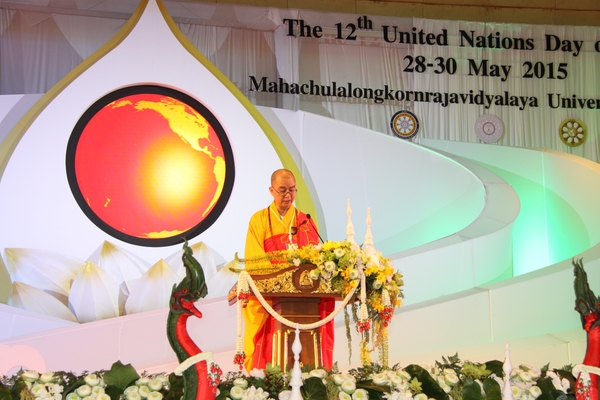
May 28, 2015 - Master Xue Cheng, President of the Buddhist Association of China, gives a speech on ’Buddhism and World Crisis’ at the 12th International Buddhist Conference on the United Nations Day of Vesak.
(Photo courtesy of Buddhism Delegation of China)
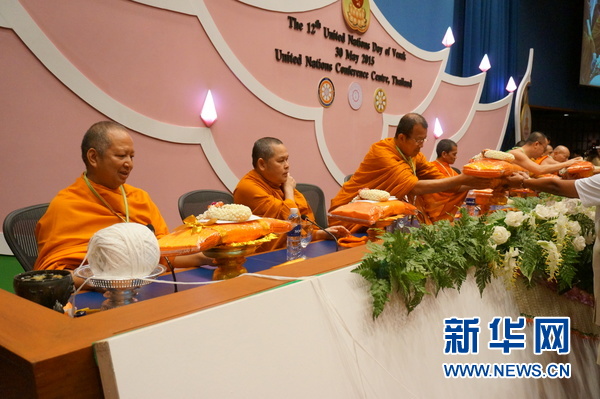
May 30, 2015 - Prof. Dr. Phra Brahmapundit, Rector of Mahachulalongkornrajavidyalaya University and President of the International Council for Day of Vesak (ICDV), holds the closing ceremony of the 12th United Nations Day of Vesak.
Bangkok, June 1 Xinhua (Correspondent Li Ying) In the conference hall of the United Nations Convention Center, yellow kasayas and plain white robes replaced business suits. Participants put their palms together and chanted sutras devoutly, the chanting echoed in the conference hall. The 12th International Buddhist Conference on the United Nations Day of Vesak celebration was held in Bangkok, the capital of Thailand, from May 27 to 30. More than 1,000 representatives from more than 80 countries and regions attended the event.
‘Promoting dialogues among civilizations’, ‘Responding to crisis and maintaining peace’ were frequently mentioned during the Day of Vesak.
At the opening ceremony, Master Xue Cheng, the head of the Chinese Buddhism delegation and president of the Buddhist Association of China, said during his speech: “The theme of the conference highlights Buddhist response to world crisis with mercy and wisdom. The world crisis which all mankind commonly face originated from human beings’ egocentrism. In order to resolve the world crisis, commonly accepted culture value systems and religious belief systems are needed to guide mankind forward. In order to gradually accomplish that, cultures and religions need to carry out in-depth dialogues and learn from each other.
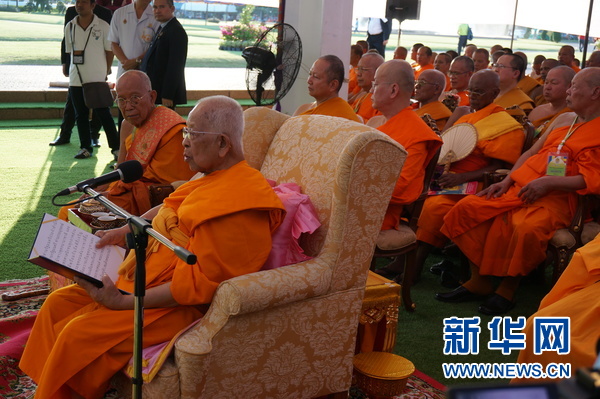
On May 30, his Holiness Somdet Phra Maharatchamangkalacharn, the Acting Supreme Patriarch of Thailand, led a chanting at Nakhon Pathom with more than a thousand eminent monks from more than 80 countries.
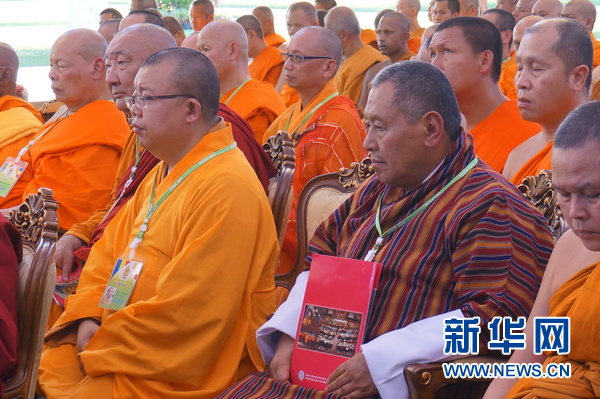
On May 30, the Acting Supreme Patriarch of Thailand chants sutras in Nakhon Pathom with more than a thousand eminent monks from more than 80 countries. Master Yanjue, vice president of the Buddhist Association of China (third from right), and Dasho Ugen Dorje, former speaker of the National Assembly of Bhutan (second from right) join in.
During the conference, Master Xue Cheng met with Somdet Phra Maharatchamangkalacharn, the Acting Supreme Patriarch of Thailand, Prof. Dr. Phra Brahmapundit, President of the International Council of United Nations Day of Vesak, and HRH Princess Bajrakitiyabha and Wisanu Krue-ngam, the deputy prime minister, and expressed their wish to further strengthening cooperation and exchanges in the future.
In the morning of May 30, Ban Ki-moon, the secretary general of the United Nations, and Bokova, director-general of UNESCO, both sent congratulatory messages. Ban Ki-moon said: “The imperative of transcending differences lies at the heart of Buddhist teachings, whose injunctions to practice compassion are timeless. Let us celebrate Vesak Day with a pledge to care for the most vulnerable people in our societies.” Bokova said: “Dialogue must be our answer. Taking the new development agenda forward will call on every woman and man to cultivate the value of peace in themselves, to build new relations of harmony and compassion with others and the world.”
The Nepalese representative made a speech. He said: “Nepal is the birthplace of Lord Buddha, the earthquake destroyed this World Heritage site, about 20 million people lost their homes, more than 9,000 people died. However, after the earthquake, eminent monks from Thailand and other countries came to Kathmandu to help.” He said the damage caused by the earthquake brought him great pain, but he was extremely grateful for the selfless donations from all parties after the earthquake.
From American, British and Japanese representatives to the monks of Myanmar, Cambodia and Vietnam, from global warming to children’s education, from border crossing refugees issue to the prospect of an ASEAN community, the speeches made by the participants all reflected their care for the practical problems commonly faced by all human beings as well as the major issues in international relations.
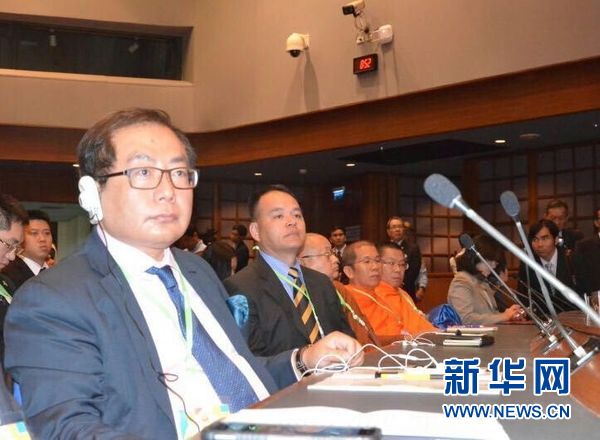
On May 30, Xiao Wunan, Executive Vice Chairman, of the Asia Pacific Exchange and Cooperation Foundation (first from left), Xu Haiping, the managing director of Chinese Buddha Light Culture Website (Second from left), attend the Day of Vesak.
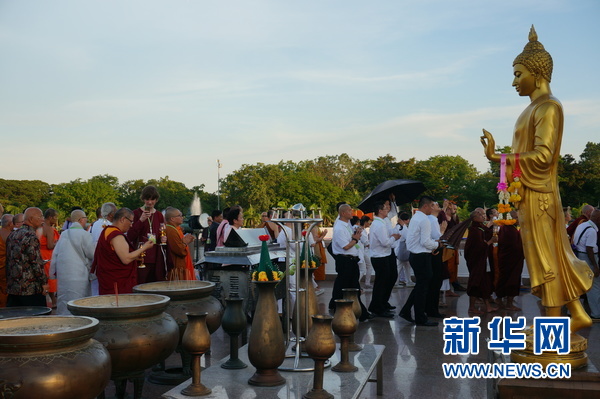
In the afternoon of May 30, Prof. Dr. Phra Brahmapundit, President of the International Council for Day of Vesak, leads the congregation in Buddhamonthon in Nakhon Pathom for candle-lighting procession.
On May 30, Xiao Wunan, Executive Vice Chairman of the Asia Pacific Exchange and Cooperation Foundation, attended the United Nations Day of Vesak as a special guest. The Asia Pacific Exchange and Cooperation Foundation has been committed to traditional Chinese culture ‘going abroad’. In 2014, it successfully pushed forward the Chinese Ksitigarbha to be enshrined in South Korea, a landmark event in China-South Korea Buddhism exchanges. In 2011, under the leadership of the United Nations, it successfully implemented Lumbini Recovery Plan. The foundation has been carrying out various activities around the world in an effort to promote “dialogue among civilizations and world peace”.
In the afternoon of May 30, Somdet Phra Maharatchamangkalacharn, the Acting Supreme Patriarch of Thailand, led the congregation in Buddhamonthon in Nakhon Pathom for a candle-lighting procession.
Day of Vesak is a festival to celebrate the birth, passing and enlightenment of the Buddha. In November 1998, the United Nations accorded the Day of Vesak international recognition. The first Day of Vesak celebration was held at the headquarters of the UN in the year 2000. Since then, the celebration of United Nations Day of Vesak was mostly held in Thailand, the renowned Buddhist country. Buddhism is the national religion of Thailand. Most Thai men enter three months
monkhood. The shortest is at least one month in order to practice Buddhism and express their gratefulness and show respect to their parents. King Bhumibol Adulyadej of Thailand also entered monkhood before he was crowned.
Nakhon Pathom is Thailand’s oldest Buddhist sanctuary. A park in front stands a 10-meter tall statue of Buddha. The Most Ven. Prof. Dr. Phra Brahmapundit, President of the International Council for Day of Vesak, led eminent monks and believers walking around the statue of Buddha with lighted candles, praying for world peace.
The Day of Vesak ended but dialogue and exchanges among civilizations will continue to shine resplendently.

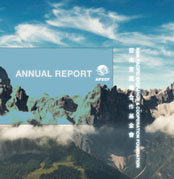
 Back
Back